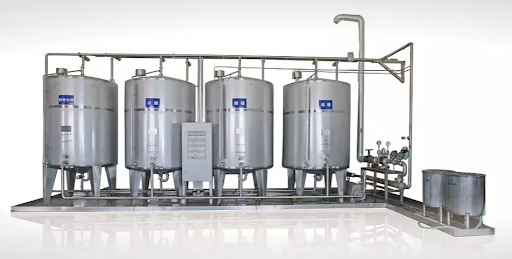To sign up for our daily email newsletter, CLICK HERE
Numerous industries rely on industrial water treatment systems to ensure clean and usable water is available for everything from drinks for clients to cleaning electronic parts. The system itself can range in size and complexity depending on the need and scope of a facility.
The point is to build industrial water treatment solutions that can handle mass production while meeting the stringent oversight and regulations of various industries. This way, the final product is safe, reliable, and of the highest quality.

What is an Industrial Water Treatment System?
An industrial water treatment system is a plumbing system that uses chemicals, membranes, or other processes to treat water for use in industrial processes. The systems are used in several industries, including food processing, oil and gas extraction, pharmaceuticals, etc. These industrial water treatment systems can be used to treat a variety of sources from freshwater lakes or rivers, brackish groundwater, sea or ocean water, or even wastewater from an existing treatment plant.
These systems can then be used to treat the source for drinking purposes as well as various other uses depending on what industry you work in or what your needs are. They bring you clean water through the following three procedures:
Water pretreatment systems involve filters to remove particulate and dissolved contaminants from a water stream before entering the industrial water treatment system. It is important to note that pretreatment may be done alone or in combination with other methods. In addition, the beverage water pretreatment system is adopted to sterilize and mix all the ingredients.
Deep treatment is simple: it’s about getting rid of contaminants in your water so you can use it safely for drinking or other purposes. In this case, you can apply membranes or ion exchanging to perform a more profound water treatment that ensures more workable resources for production.
The terminal treatment is the final step in industrial water treatment. This involves ozone, UV, polisher, EDI, or CDI methods.

Applications of Industrial Water Treatment Systems
Industrial water treatment systems are used to optimize production and industrial processes that require water as part of the steps. This could be heating, cooling, processing, cleaning, and rinsing. With so much versatility, having a functional and easy-to-maintain system is essential to a wide range of niche industries. Some include:
Water is often used as a primary ingredient in beer brewing, soft drinks, carbonated beverages, and fruit juices. To produce these products efficiently and economically, the quality of this raw material must be always maintained. This means that any contaminant must be removed before using this process stream and after any other unit has treated it.
As the name suggests, desalination is a process that removes salt from water. It is used to produce drinking water and clean water for other uses. Saltwater desalination involves using energy to remove salt from water. Most industrial desalination plants use reverse osmosis or distillation to remove salt from seawater or brackish groundwater.
- Rinsing Water for Industrial Use:
Water treatment systems for rinsing water for electronic parts are used to keep the quality of the water high. Water is an essential part of many industrial processes and, as such, needs to be treated before its use. In addition, the use of a water treatment system can help prevent damage or failure in your equipment, reduce maintenance costs and extend the life span of your products.

Boiler makeup water is used to cool the steam and remove impurities. Water treatment systems for boiler makeup water are designed to treat the used water from your plant, which can be recycled or used as an input for other processes. These systems may also be called cooling towers or condensers. This added water makes up for any losses from steam or heat loss.
- Sterile Water for Chemical Use:
Many chemical processes involve using sterile water as a medium for chemical reactions. This can be done by adding chemicals to a solution or exposing them to radiation to reduce contaminants from microorganisms in their surrounding environment.
This is the wastewater produced by different industries as leftover resources from production. The goal is to improve the water quality, so it is safe to be reused or released into the environment.

Getting the Best Quality Industrial Water Treatment System
As all the different applications have shown, the importance of a quality industrial water treatment system cannot be understated. This is a critical step in using, producing, and recycling a natural resource.
That is why you must work with a seasoned industry veteran like Tech-Long who understands how to integrate the best possible solutions for your business or entity. Since 1998, Tech-Long has provided a wealth of experience in the industrial production process with solutions for smart packaging technology, including water treatment and beverage pretreatment systems. To learn more about how this innovative, research-focused company can improve your systems, schedule a call with a team expert today!